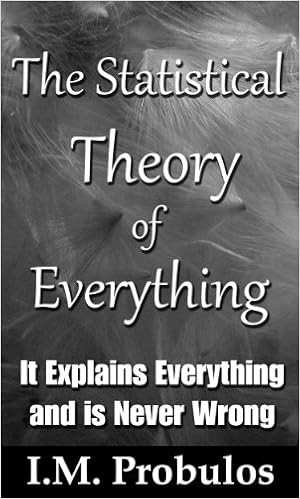
This Kindle book is for non-believers, including atheists, agnostics and secular humanists who believe in a deterministic world. It is assumed that you don’t base your worldview and morality on superstition, the supernatural or any deity. It is not for the “spiritual but not religious” as it assumes a materialistic world and a reductionist perspective on the human condition. For those who doubt their faith or have recently lost it, If you do not believe the universe or a personal deity loves you and is concerned with your daily affairs this book could help you prosper.
This concept is not to be confused with Stephen Hawking’s The Theory of Everything (2007), a unified theory that includes quantum mechanics and the fundamental interactions of nature: gravitation, strong interaction, weak interaction, and electromagnetism. That’s very interesting, but another subject altogether.
Again, this Theory is not about physics.
The Statistical Theory of Everything (STE) presents a novel and useful thought process to help you manage and thrive in a world of science, reason and rationality. It is excerpted and expanded from my book the 12 Unthinkable Horrors of Human Existence. It is related to a concept called “statistical theology” discussed in a short article in Skeptical Inquirer (2001) by noted science-fiction writer Arthur C. Clarke. It offers a unique worldview without free will, fate, agenticity, patternicity, the supernatural and a personal God.
This would be a great concept to discuss during a Freethought Alliance or Secular Humanist study group. I don’t expect universal agreement and encourage debate. Does it have merit? Does it help you deal with a capricious and uncaring universe that is indifferent to your well-being? How do you explain why bad things happen to good people? How do you explain the “miraculous” one survivor out of 100? How do you explain great suffering, misery and natural disaster? Personally I think this concept provides those who lack faith with great optimism, hope, and purpose.
I.M. Probulos
Recent Comments